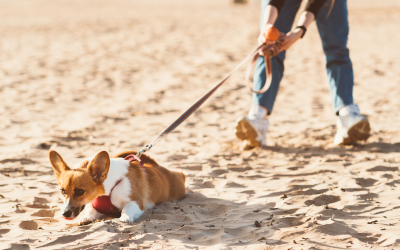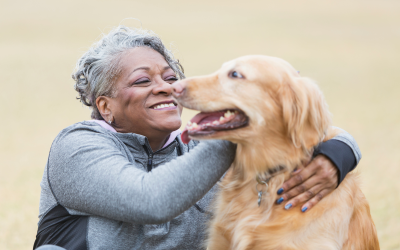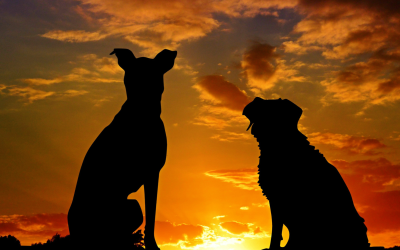The Fourth of July may be an exciting holiday for humans, but it is often very difficult for dogs thanks to all the fireworks going off. Dogs don’t understand why the sky is lighting up and explosions are ringing out for hours on end, which can lead to extreme anxiety in some cases.
In fact, this anxiety can be so acute that many dogs panic and run away during fireworks. In fact, both the American Kennel Club (AKC) and the American Society for the Prevention of Cruelty to Animals (ASPCA) both report that the busiest day of the year for animal shelters is July 5th, when they often become overrun with dogs who’ve run away and become lost.
So, helping your dog to cope with fireworks will not only help your pupper feel better, but it may also even help prevent them from running away. I’ll try to help you do exactly that below, by sharing some of the things you can do to make your pooch feel better during fireworks.
Signs That Your Dog is Afraid of Fireworks

In many cases, it’s obvious that a dog is afraid of fireworks, but the signs of fireworks anxiety can also be subtle at times. And in some cases, owners may not make the connection between fireworks and their dog’s unusual behaviors.
So, familiarize yourself with the following signs that may indicate that your dog is experiencing firework anxiety:
- Pacing
- Trembling
- Drooling
- Consistent panting
- Repeated yawning
- Hiding
- Attempting to escape your home
- Barking
- Whining
- Howling
- Clinginess
- Inability to settle
- Accidents
- Refusing food or water
- Vomiting
- “Panicked” behaviors
If you notice any of these symptoms, you can be reasonably sure that your dog is frightened by fireworks, so you’ll want to implement the tips provided below.
What to Do In the Moment: Basic First Steps for Addressing Firework Anxiety

The first things you’ll want to do when you realize your dog is suffering from a fireworks fear are ensure their safety, limit the intensity of the stimuli as much as you can, and provide some comfort.
This means you’ll want to:
- Keep your dog inside. While it may be acceptable to allow a dog who’s not bothered by fireworks outside during the chaos, those with firework anxiety may react in unpredictable ways.
- Close your windows, curtains, and blinds. While this may not eliminate all the noise and flashing lights, it will help reduce the anxiety-triggering stimuli to some degree.
- Consider playing some music or background noise to help cover the loud sounds. You may want to try different things, like soft music, soundtracks specifically designed for dogs, your television, loud fans, or white noise.
- Try to distract your dog with high-value toys or chews. A KONG filled with peanut butter, a bully stick, or an interactive toy may help focus your dog’s attention and provide some relief.
- Remain calm yourself. Your dog will notice your anxiety level and use it as a cue, so try your best to stay calm and act as though everything is normal.
After doing these things, simply try to comfort your dog as best you can. The ideal way to do so will vary from one pooch to the next, so use your judgement and knowledge of your dog’s preferences to guide your efforts. For example, some dogs may find it comforting to be gently brushed during this time, while others may prefer simply laying in your lap and getting pets.
Short-Term Calming Tools & Techniques

The previously mentioned steps may be helpful when you first discover that your dog is not reacting well to fireworks. However, there are some other things you can do to be prepared for the next time fireworks start happening. These types of techniques and approaches vary in their efficacy, so don’t be afraid to try them all and determine which one works best.
Anxiety Wraps
Anxiety wraps are tight-fitting garments for dogs that work somewhat like swaddling blankets do for human babies, and some dogs simply find comfort in garments that fit them very tightly. Thundershirts are popular commercial anxiety wraps, but there are other commercially manufactured options, and you can even make your own.
To help prevent your dog from developing an association between the fireworks and the anxiety wrap, it’s probably a good idea to let them wear it during normal, calm times on occasion.
Exercise Before the Fireworks
Exercise is one of the magic bullets I often talk about, as it helps with so many behavioral and canine-management challenges. Vigorous activity isn’t likely to completely eliminate your dog’s anxiety once the fireworks start exploding in the sky, but it may tire them out and make it easier for them to sleep during the chaos.
As a bonus, an afternoon spent chasing a Frisbee, swimming, or going on a long walk with their two-footer will cause their brain to release endorphins and relieve any existing stress or anxiety. This may help your dog start the unpleasant night in a better mental and emotional space.
Prepare a Soundscape
The first episode of fireworks fear probably caught you off guard, so you didn’t have any time to prepare. But you’ll know what’s in store for subsequent fireworks experiences, which means you can plan ahead and have some good noise or music ready.
In fact, it’s a good idea to have multiple options at the ready, in case you need to experiment. So, grab your white noise machine, have a way to play music ready, and have a dog-friendly TV show cued up and ready to go.
Calming Chews
There are a variety of calming chews available on the market, which are designed to help four-footers relax. These chews vary pretty widely in terms of their active ingredients; some may feature things like melatonin, while others contain L-theanine, L-tryptophan, chamomile, or valerian root. And many contain several different active ingredients.
Just be sure to discuss the use of calming chews with your vet beforehand and be sure to experiment with different formulations to find one that works best for your dog.
Adaptil Diffusers
Adaptil diffusers are another option that’s proven helpful for many dogs. These diffusers work by releasing a synthetic version of Dog Appeasing Pheromone into the air. This hormone is released by canine mothers shortly after giving birth, and it helps to keep young puppies calm.
It’s generally recommended that pet parents plug in these diffusers several weeks before the fireworks start, to help keep their dog’s anxiety low in the time leading up to the fireworks.
CBD
Cannabidiol (CBD) is a naturally occurring cannabinoid that is found in the Cannabis plant. It is thought to have anxiety-reducing properties, among several other potential health benefits. So, some pet parents may wish to try it with dogs suffering from fireworks anxiety.
It is important to discuss the use of CBD with your vet before administering it. There haven’t been very many serious studies into its effects on dogs yet, so caution is warranted.
Long-Term Coping and Desensitization Strategies

Anytime you discover that your dog is afraid of fireworks, you’ll want to employ the immediate safety measures discussed earlier, as well as those short-term fixes that may give your dog some relief. However, you’ll usually find that desensitization work is the only way to provide your pupper with lasting, long-term relief.
Desensitization typically involves exposing your pup to very tiny doses of unpleasant stimuli, while they’re feeling otherwise calm and confident. For example, you may start by playing the sounds of fireworks very quietly in the background, while going about your typical routine. Over time, you should be able to gradually increase the volume, as your dog becomes more accustomed — desensitized — to the sounds.
However, it is important that you do so slowly while observing your dog carefully. To be effective, you need to keep your dog under their “threshold of fear.”
In other words, you want your dog to hear the sounds, but you don’t want the sounds to be loud enough to cause fear. So, if you see your dog exhibit any of the signs discussed earlier, stop the exercise, and try again some other time at an even lower volume.
Desensitization work takes some time, so you’ll want to be patient, and consider soliciting the help of a private trainer, who can coach you through the process.
Veterinary Solutions

In some cases, neither short-term dog-management techniques nor long-term desensitization strategies will be enough to help your dog cope with fireworks. In these cases, you may want to discuss the possibility of medications with your vet.
This is never something to take lightly, but for some dogs, the benefits of medications outweigh the stress and anxiety that fireworks often cause. Just be sure that if you decide to try medications, you only use those your vet has prescribed for your dog, specifically (don’t use some that were prescribed for you or a friend’s dog). Additionally, be sure that you always administer them as instructed.
Three Important Things to Avoid

I’ve tried to focus on explaining some of the things you can do to help your dog feel better when fireworks start lighting up the night sky. But it’s just as important to discuss some of the things you should never do when faced with a pupper who’s frightened by fireworks.
This includes:
- Never punish or scold an anxious dog. Doing so will not help, and it’s likely to exacerbate the anxiety your pup is feeling. Additionally, it’s just cruel — it’s not your dog’s fault that they’re afraid of the fireworks.
- Never force your dog to “face their fear.” Another cruel practice that’s likely to make your dog’s anxiety worse, forcing your dog to confront a frightening stimulus like this may seriously harm your relationship and ruin some of the trust you’ve built.
- Never leave gates or doors open. Even if your dog didn’t try to escape the last time fireworks were happening doesn’t mean it won’t happen this time. In some cases, anxiety may grow with every fireworks experience, causing your dog to act unpredictably.
Get Help When You Need It!

Dealing with fireworks phobias often means implementing several different approaches. You may, for example, fit your pup with an anxiety wrap and play soothing music during the drama, while working on long-term desensitization strategies.
Unfortunately, I can’t help you soothe your dog at the moment (though I will send you and your pooch supportive vibes). But I can absolutely help with your long-term desensitization efforts. I help a lot of pet parents desensitize their dogs to upsetting stimuli, ranging from skateboarders to unfamiliar humans to loud sounds – just like fireworks.
I’d be delighted to help you with your dog too! Just head over to my contact page and tell me about your pup’s struggles. I’ll get right back to you with a plan for helping your four-footer feel better!





Recent Comments